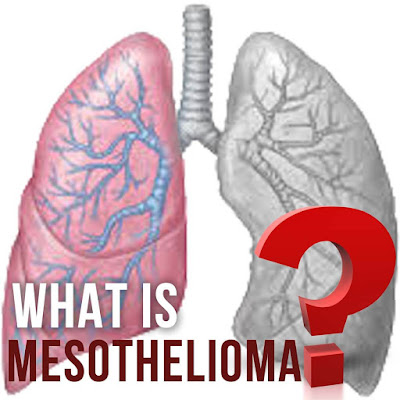 |
| Mesothelioma Cancer |
Mesothelioma Cancer - What is Mesothelioma Cancer
Mesothelioma is a type of cancer that develops from the slim layer of tissue that covers many of the internal organs (known as the mesothelium). The most ordinary area affected is the lining of the lungs and chest wall. Less normally the lining of the abdomen and hardly ever the surrounding the heart, or the surrounding the testis may be affected. Signs and symptoms of mesothelioma cancer may include shortness of breath due to fluid around the lung, a swollen abdomen, chest wall pain, cough, feeling tired, and weight loss. These symptoms naturally come on gradually.
Mesothelioma Cancer is a cancerous or malignant tumour that starts
in cells of the mesothelium. Malignant means that it can spread, or
metastasize, to extra parts of the body.
The mesothelium cancer is a membrane that covers and protects most
of your internal organs. It is made up of 2 layers. The inner layer wraps
around different organs, with the lungs, heart and stomach. The outer layer
forms a sac around the inner layer. There is a small amount of fluid between the
2 layers so that the organs can move easily.
The mesothelium cancer has different names, depending on where it
is in the body. The mesothelium that protects and cushions the lungs is called
the pleura. The inner layer that covers the lungs is called the visceral
pleura. The outer layer that lines the inside wall of the chest is called the
parietal pleura.
Did you know that doctors diagnose an estimated 3,000 cases
of mesothelioma annually in the U.S.? The majority of those are traced to
job-related exposures to asbestos. Most people have the pleural type, which
forms on the lining of the lungs, but the cancer can also form approximately
the lining of the abdomen or heart.
There are three recognized mesothelioma cell types. Between
50% and 70% of all mesotheliomas are of the epithelial variety. While prognosis
is generally poor, it is considered less aggressive than sarcomatoid
mesothelioma and biphasic mesothelioma, which comprise the remainder of
cell-type diagnoses.
The cavities within the body encompassing the chest,
abdomen, and heart are surrounded by a membrane of cells known as the
mesothelium. Mesothelial cells assist in universal organ functions. The
mesothelium cancer is particularly important to organs that are commonly in motion,
such as expansion or contraction of the lungs, stomach, or heart. Lubrication
from the mesothelial cells allows free range of motion within the body. The
mesothelium of the chest, abdomen, and cardiac cavity are called the pleura,
the peritoneum, and the pericardium, respectively. Each of these groupings of
mesothelial cells is extremely dangerous to the functions of the body
structures which they encompass.
While tumors of the mesothelium were first recognized in the
late 18th century, it was not until the middle of the 20th century that this
exacting cancer was studied and examined with more detail. It was at this time
when suspicions of the cancer’s causal relationship with asbestos exposure
became more substantiated. A joint research venture through the Department of
Thoracic Surgery at the University of the Witswater and Johannesburg General
Hospital in South Africa provided the most compelling evidence of the nexus
between asbestos exposure and the development of pleural mesothelioma.
Incidence of mesothelioma is still quite rare, with only
2,500-3,000 diagnoses in the United States each year. There was a spike in
reported diagnoses between 1970 and 1984, which has been credited to the
latency period between diagnosis and the height of industrial exposures, which
occurred roughly 40-60 years prior to this time.
Mesothelioma Cancer can be a difficult malignancy to diagnose
because the symptoms of the disease personally resemble other respiratory
conditions, and because the pathology can be very difficult to differentiate
from adenocarcinoma of the lung. For these reasons, misdiagnosis is not
uncommon in mesothelioma patients. Symptoms of mesothelioma include chest pain,
chronic cough, effusions of the chest and abdomen, and the presence of blood in
lung fluid.
What is Mesothelioma Cancer
Mesothelioma Asbestos
Peritoneal Mesothelioma
Symptoms of Mesothelioma
Mesothelioma Lung Cancer
Malignant Mesothelioma
Treatment For Mesothelioma
Mesothelioma Cancer Causes
Pleural Mesothelioma Cancer
Mesothelioma Survival Rates
Prognosis For Mesothelioma
Where did Lung Cancer Originate
Mesothelioma Asbestos
Peritoneal Mesothelioma
Symptoms of Mesothelioma
Mesothelioma Lung Cancer
Malignant Mesothelioma
Treatment For Mesothelioma
Mesothelioma Cancer Causes
Pleural Mesothelioma Cancer
Mesothelioma Survival Rates
Prognosis For Mesothelioma
Where did Lung Cancer Originate

No comments:
Post a Comment